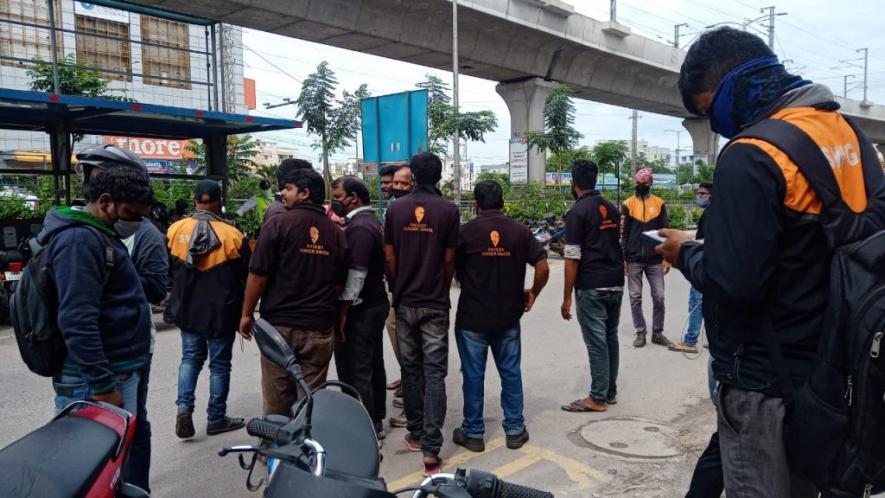Bumpy Road Ahead for App-Based Workers Despite Being Qualified for Social Security

Representational Image. Image Courtesy: MediaNama
A national body representing transport workers, particularly those who are engaged with the application-based platforms – colloquially known as part of the gig economy, has raised issues with the guiding framework that was shared last year by the Centre with the states to regulate the private aggregators’ business.
The Motor Vehicle Aggregator Guidelines 2020 are not “inclusive in nature”, as it “excludes food and goods delivery workers and women drivers who are part of the gig and platform work,” Indian Federation of App-based Transport Workers (IFAT) said in a press statement, released on Tuesday, February 9.
The statement added that the said guidelines also attempt to bring in newer forms of partnerships in ride sharing and polling services which may “jeopardise the safety of the riders and impact the earnings of the driver.”
The Union Ministry of Road Transport and Highways had on November 27 last year issued the Motor Vehicle Aggregator Guidelines 2020 under the provisions of the amended Motor Vehicles Act. Reportedly, both the cab aggregators (Ola and Uber) and the drivers were unhappy with the framework for different reasons.
While the guidelines have provided certain safeguards for the app-based platform workers, at the same time, they cast doubt on the practicality and accessibility of the provisions proposed, Shaik Salauddin, national general secretary, IFAT said on Tuesday.
As such, in another document released on the same day, the union has suggested a number of clause-specific inputs to the guidelines that are aimed to regulate shared mobility and provide a set of regulation for the private aggregators – not available prior to the amendment to the said act.
Also read: Experts Call for Legal Framework Before Social Security for App-Based Workers
For example, the union has suggested to amend the text “Regulation of fares” to “Regulation of fares and delivery charges” under the clause 13 of the guidelines to ensure that appropriate rates for the users of food/goods delivery services and earnings for the delivery executives are implemented keeping in line with the rules and regulations imposed on the aggregator for riders and drivers.
This suggestion from the union has come in the backdrop of multiple work strikes last year that were led by the food delivery executives across the country, particularly by those engaged with Swiggy.
Moreover, the new guidelines, Salauddin said, integrates social security in the form of insurance (health and others) for the drivers but fails to elaborate on how the workers will be able to access these schemes or will government monitor and audit the aggregators to ensure compliance and implementation.
Incidentally, the Code on Social Security 2020 also qualifies an app-based worker to be eligible for benefits such as life and disability cover, old age protection among others, which were all also emphasised in Finance Minister Nirmala Sitharaman’s Budget speech earlier this month.
The new labour code, which the Centre claims extends social security to workers both in organised and unorganised setups along with – for the first time – to the gig workers, is among the four codes that are slated for the implementation in the coming days.
As per the code, the gig companies will have to put aside 1 to 2% of their annual turnover for social security funds of their workers; the contribution by an aggregator shall not exceed 5%. Among the reasons that had worried the private companies is that, now with the implementation of the social security code, there might be cost duplication, as similar contributions have also been mandated by the guidelines under the Motor Vehicle Act.
“Although the Finance Minister in the Budget speech has informed about the large-scale investment to provide Social Security for gig and platform workers, there remains lot of confusion and absence of clarity on when the Welfare Board shall be established for gig and platform workers,” Salauddin told NewsClick.
Demanding a legal framework for the app-based workers, experts on gig-economy had claimed that the new policy decisions towards these workers at best only allows for incremental changes, or a policy design that “lacks imagination”.
Get the latest reports & analysis with people's perspective on Protests, movements & deep analytical videos, discussions of the current affairs in your Telegram app. Subscribe to NewsClick's Telegram channel & get Real-Time updates on stories, as they get published on our website.
























